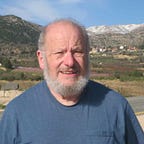Why Are We Here?
The story is told of a preacher who was invited to preach to the patients at a mental hospital. They gathered round to hear what the preacher had to say. He began by asking the rhetorical question “Why are we here?”. Immediately one of the patients piped up. “We’re all here because we’re not all there!”.
But why are we here? The very question assumes part of the answer: we’re here because our being here serves some purpose. Yet there’s no self-evident reason why our lives should have a purpose, or at least an externally given purpose.
For some religious people, our purpose on earth is to glorify the Lord. But that doesn’t make much sense to me; if the Lord is omnipotent, why should He need or even care about whatever glorification we humans can provide to Him? A related answer is that our purpose is to fulfill the Lord’s plans for the world. But that answer, too, founders on the issue of the Lord’s omnipotence. The only explanation of the Lord’s purposes that I can see is that He is playing a form of divine solitaire; He makes the rules and then commits Himself to abide by them.
God and Satan agreed to play golf. God went first and shanked his ball far to the right. But an eagle swooped down, seized the ball, and dropped it far down the fairway. No sooner had it stopped rolling when a bolt of lightning struck the fairway, creating a mound that caused the ball to roll onto the green. A swarm of ants appeared and pushed the ball into the hole — a hole in one for God! Satan looked at God with disgust and asked, “Look, God, do you want to screw around or do you want to play golf?”.
To seek an answer to the question of why we are here, it helps to pose the question more broadly: why is anything here? Do people serve a different purpose than is served by cats, volcanoes, poison ivy, or the sun? My answer to that is no — everything in the universe ultimately serves the same purpose, or no purpose. We’re here because we’re here. But we can create purposes for ourselves, purposes that continually evolve and define our goals.
It’s often been pointed out that life is a journey, not a destination. There are exceptions such as suicide bombers, but not many. If my goal in life is to amass a billion dollars, then once I’ve gotten that billion dollars my goal is fulfilled and I need a new goal. If my goal each day is just to get through the day, then I always have a goal, but not a very satisfying one. For a goal to be truly satisfying, it must be one that I can pursue for a lifetime but never fully reach.
Franklin Roosevelt created the March of Dimes to seek a cure for polio and secondarily to provide help for polio victims. When the Salk vaccine was discovered, the organization’s primary purpose was no longer meaningful, so it pursued a different objective: the prevention of birth defects and infant mortality. When an alpinist sets the goal of climbing the highest peak on each continent, that goal needs to be reformulated when those peaks are actually summited. For instance, the new goal might be to climb all the peaks within a single year. In any event, these goals are not dictated by nature; they are created by the individual.
My life may not have a purpose, but I surely have goals, both immediate and long term. Goals exist in a hierarchy; longer-term goals imply the shorter-term goals that lead to them. Some goals are biological imperatives; hunger drives us to seek food and weariness drives us to sleep. As conscious creatures we have the opportunity to deliberately choose our longer-term goals, though most people, I would guess, don’t avail themselves of that opportunity. In having long-term goals we differ from even the most intelligent of animals. It seems doubtful that elephants, for instance, have long-term goals beyond survival and propagation of the species.
Most people are propelled through life by the fear of death, or more precisely, the fear of dying. But I have come to see that differently. I had a near-death experience about a year ago, when a stomach ulcer I was quite unaware of started to bleed and I passed out. When I came to, groggy, the EMTs were tending to me. Without their help I would have bled to death without regaining consciousness. What I remember most vividly was how peaceful I felt, not anxious or distressed at all. I learned that dying is not something I need to be afraid of, at least if it is peaceful and painless.
But my view on that might be influenced by my age. The younger we are, the more things we miss out on by dying too soon. I sometimes think of life as a meal where we look forward to each course. Once we’ve had dessert, there are no more courses.
Eternal life would not be a blessing. I would not want to live for a thousand years, even if I could remain in the perfect health, retain my peak capacities, and satisfy all my material desires. Eventually I would run out of unfulfilled goals and my life would become excruciatingly boring.
A man went to a theatrical agent and offered him a deal. “I’ll stand on the stage, shoot myself in the head, and die on the spot. All I ask in return is that my widow receive $10,000 from the box office receipts.” The agent answered, “That’s a great idea!! But what will you do for an encore?”.
